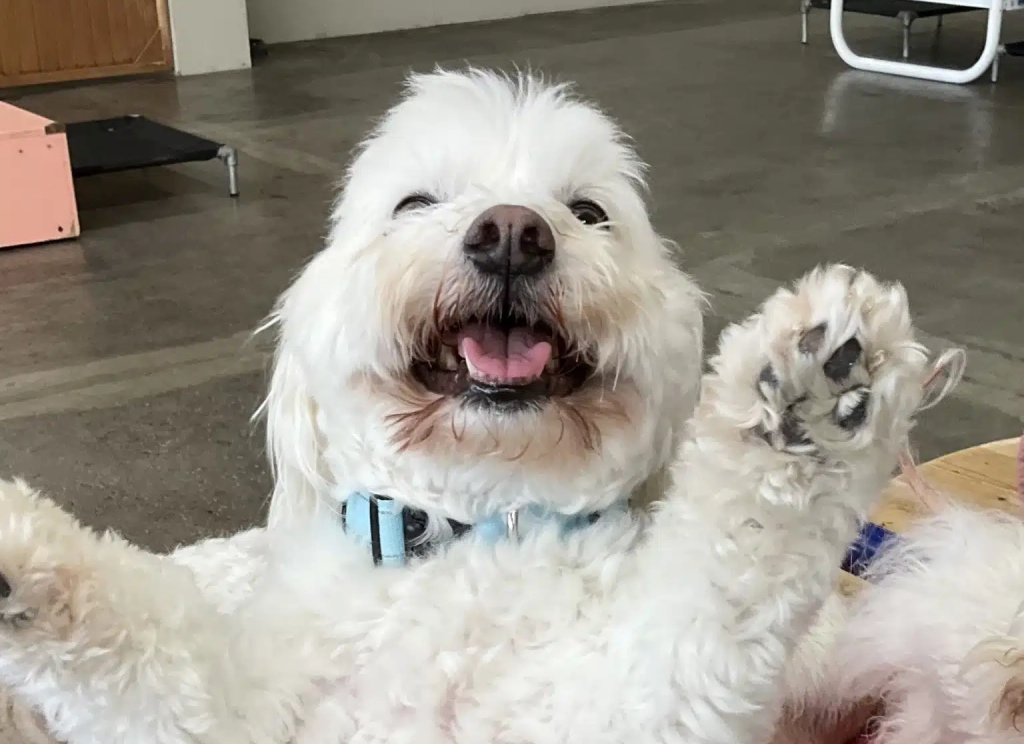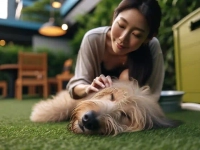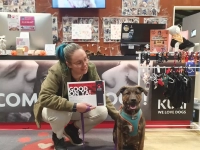How Quality Doggy Daycare can Help Socialise you Dog
In This Article...
THE OVERVIEW...
How Quality Doggy Daycare can Help Socialise your Dog
Doggy daycare has become an increasingly popular option for pet owners looking to provide their furry friends with socialisation, exercise, and care during the day. This article explores how quality doggy daycare can significantly contribute to the socialisation of your dog, helping them become well-adjusted and happy companions.
What is doggy daycare and how does it promote socialisation?
Understanding the concept of dog socialisation
Dog socialisation is the process of exposing dogs to various experiences, environments, and interactions to help them become well-adjusted and confident. Quality doggy daycare is an option for busy owners who are wanting to provide a safe and controlled environment for dogs to interact with others but may not have the time of expertise to do it themselves. At Kuri, dogs have the opportunity to engage in structured social interactions, which are essential for their emotional and behavioural development. These experiences help dogs learn how to communicate effectively with other dogs and humans, reducing the likelihood of anxiety or aggression in future social situations.
The role of doggy daycare in canine socialisation
Doggy daycare serves as a valuable tool for promoting canine socialisation by offering a controlled and supervised environment for dogs to interact. Unlike dog parks, where interactions can be unpredictable (how many times have you been to a dog park and been told the approaching dog is friendly, only to find it isn’t), our daycare employs trained staff to manage social interactions. This ensures that every dog receives the appropriate level of socialisation based on their individual needs and temperament.
Daycare services are more adaptable than traditional boarding kennels, allowing for a more tailored approach to each dog’s socialisation journey. By attending daycare regularly, dogs can develop crucial social skills and build confidence in their interactions with both humans and other dogs.
Benefits of structured social interactions for dogs
Structured social interactions at doggy daycare offer numerous benefits for dogs. These controlled environments allow dogs to learn proper play etiquette, understand canine body language, and develop essential communication skills. Regular attendance at daycare can help reduce separation anxiety, as dogs become accustomed to spending time away from their owners in a positive setting. Moreover, the consistent exposure to various dogs and people can help prevent behavioural issues that may arise from lack of socialisation.
Daycare also provides mental stimulation and physical exercise, which are crucial for a dog’s overall well-being. The combination of social interaction, mental engagement, and physical activity makes doggy daycare an excellent option for pet owners looking to enhance their dog’s social skills and quality of life.
What are the key socialisation skills dogs learn at Kuri?
Developing proper play etiquette with other dogs
At quality doggy daycare facilities, dogs learn essential play etiquette that helps them interact positively with their canine peers. Through supervised play sessions, dogs discover how to initiate play appropriately, respect boundaries, and understand when to back off. This learning process is crucial for preventing aggressive behaviour and ensuring safe interactions. Daycare staff members are trained to recognise and encourage proper play behaviours, helping dogs develop the social skills necessary for harmonious group interactions.
At Kuri we we only take small dogs and we group dogs according to their energy levels, this helps manage interactions from the beginning of the day. As dogs become more adept at reading and responding to social cues, they become better equipped to navigate various social situations both inside and outside the daycare environment.
Learning to read and respond to canine body language
One of the most valuable skills dogs acquire at daycare is the ability to interpret and respond to canine body language. Through regular interactions with a diverse group of dogs and reinforcement from our handlers, they learn to recognise subtle cues and signals that indicate a dog’s emotional state or intentions. This enhanced understanding of body language helps prevent misunderstandings and potential conflicts between dogs.
Improving overall communication skills with humans and dogs
Doggy daycare not only enhances a dog’s ability to communicate with other canines but also improves their interactions with humans. Through daily exposure to the Kuri daycare staff, our daycare dogs learn to respond to different voices, gestures, and commands. This helps dogs become more adaptable. Additionally, the structured environment of daycare allows dogs to practice following rules and routines, which can translate to better behaviour at home. Owners often report their pup has improved leash manners, greeting behaviours, and overall obedience. The combination of canine and human socialisation at daycare contributes to the development of well-rounded, socially confident dogs.
How does doggy daycare differ from dog parks for socialisation?
Comparing supervised vs. unsupervised social interactions
Doggy daycare offers a significant advantage over dog parks when it comes to socialisation due to the level of supervision provided. At Kuri our trained staff keep a close eye on all interactions between dogs, ensuring that play remains safe and appropriate. This supervised environment allows for immediate intervention if any issues arise, preventing negative experiences that could hinder a dog’s socialisation progress. In contrast, dog parks often lack professional oversight, which can lead to unpredictable and potentially dangerous situations.
Safety measures and trained staff at doggy daycare
Quality doggy daycare facilities prioritise safety through various measures and the presence of trained staff. Unlike dog parks, daycares implement strict health and vaccination requirements to minimise the risk of disease transmission. Our staff all have training in dog behaviour, body language, and safe handling techniques, allowing them to manage group dynamics effectively. We also make sure that we separate dogs based on age or temperament to ensure compatible play groups. These safety measures create a secure environment where dogs can socialise without the risks often associated with uncontrolled settings like dog parks. The presence of knowledgeable staff also means that owners can receive valuable feedback about their dog’s social progress and behaviour, at Kuri we even do end of class reports!
Tailored socialisation experiences based on individual needs
One of the key advantages of doggy daycare is the ability to provide tailored socialisation experiences. Before attending, all dogs have an assessment to determine a dog’s personality, energy level, and social skills to place them in appropriate play groups. This individualised approach ensures that every dog receives the right level of social interaction and stimulation for their needs. For example, a shy dog might be gradually introduced to smaller groups before joining larger play sessions, while a high-energy dog might be paired with similarly active playmates. This customised socialisation strategy helps dogs build confidence at their own pace, reducing the likelihood of overwhelming or negative experiences that could occur in less controlled environments like dog parks.
What age is best to start doggy daycare for great socialisation?
Understanding critical socialisation periods in puppies
The critical socialisation period for puppies typically occurs between 3 and 16 weeks of age. During this time, puppies are most receptive to new experiences and are forming lasting impressions of the world around them. At Kuri we only take vaccinated puppies over 16 weeks and only for half days. We know that quality early socialisation through daycare can help prevent fear and anxiety issues later in life, but only if it is managed well. However, it’s important to ensure that puppies have received appropriate vaccinations before attending daycare to protect their health.
Benefits of early socialisation through daycare
Starting doggy daycare during a puppy’s critical socialisation period can yield numerous benefits. Early exposure to diverse social situations helps puppies develop confidence and adaptability, reducing the likelihood of behavioural problems as they mature. Daycare provides opportunities for puppies to learn appropriate play behaviours, bite inhibition, and social cues from both other dogs and humans. These early positive experiences can contribute to the development of a well-adjusted adult dog. Additionally, attending daycare from a young age can help prevent separation anxiety by accustoming puppies to spending time away from their owners in a positive environment. The structured setting of daycare also supports basic training efforts, reinforcing commands and routines that complement at-home training.
Considerations for introducing adult dogs to daycare
While early socialisation is ideal, adult dogs can still benefit greatly from doggy daycare. When introducing an adult dog to daycare, it’s important to consider their previous socialisation experiences and any existing behavioural issues. All dogs that attend Kuri receive a temperament assessments and free half day to ensure that we’re a good match. For dogs with limited social experience, a gradual introduction to daycare may be necessary, starting with shorter visits or one-on-one interactions before progressing to group play. Adult dogs may require more patience and support as they adjust to the daycare environment, but with consistent attendance, they can still develop improved social skills and confidence. We encourage owners to be open with our staff about their adult dog’s history and any concerns to ensure a positive experience.
How can owners support their dog’s socialisation progress from daycare?
Reinforcing positive behaviours learned at daycare
To support their dog’s socialisation progress from daycare, owners should actively reinforce the positive behaviours learned in that environment. This can involve practising commands and social skills at home or in other settings, using similar cues and rewards as those used in daycare. Consistency is key in reinforcing these behaviours, so owners should check in regularly with our team to understand what skills their dog is working on. Encouraging calm greetings, appropriate play, and good manners outside of daycare helps solidify these learned behaviours.








